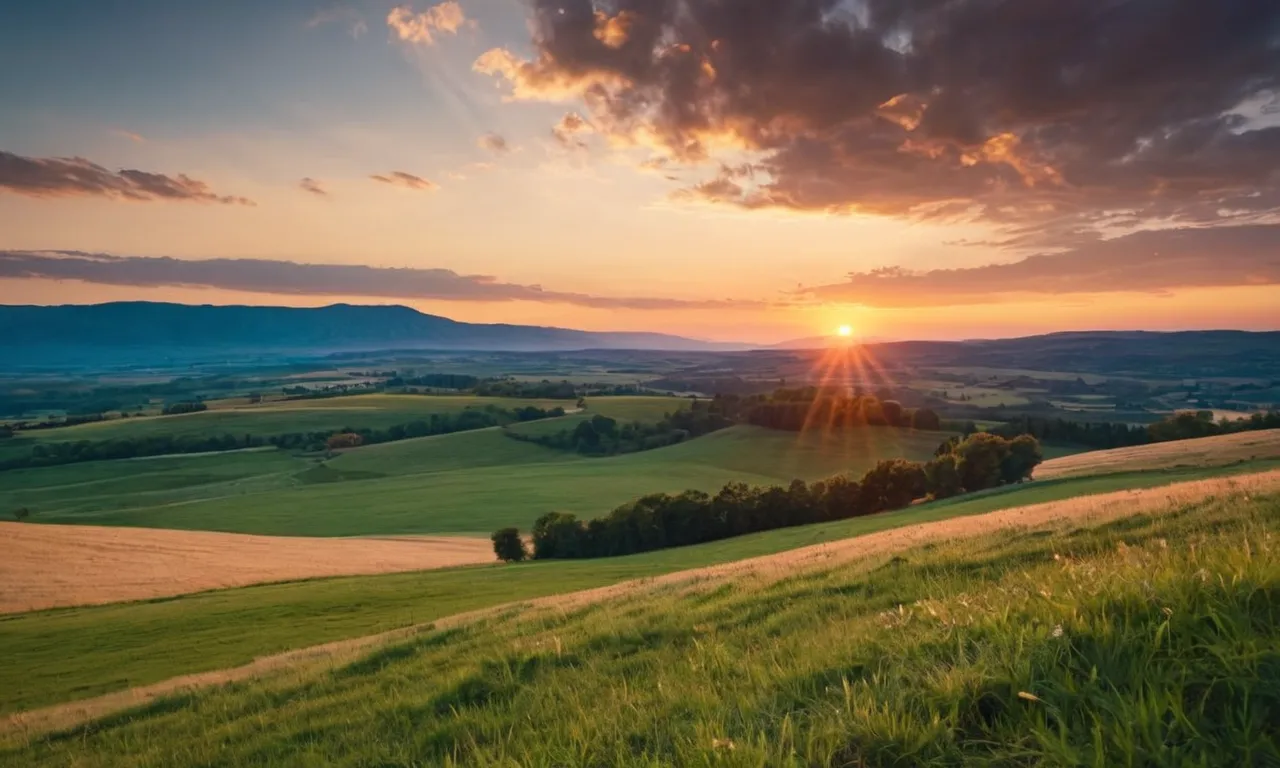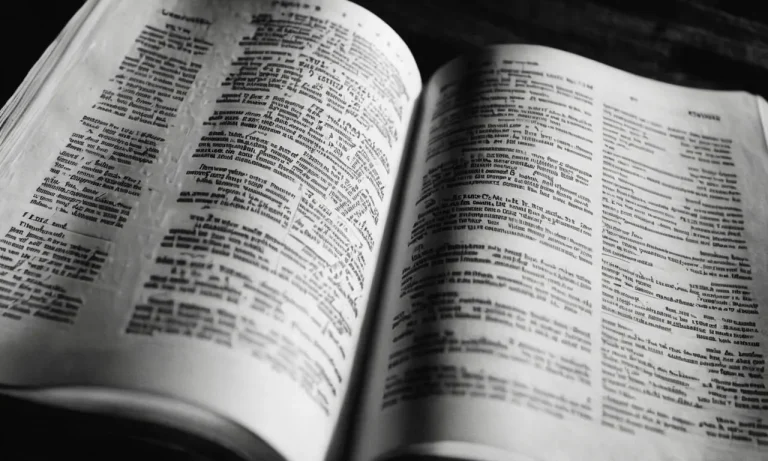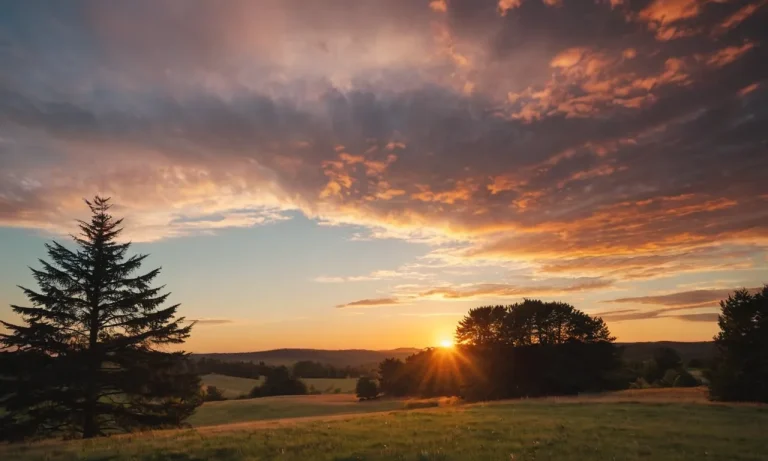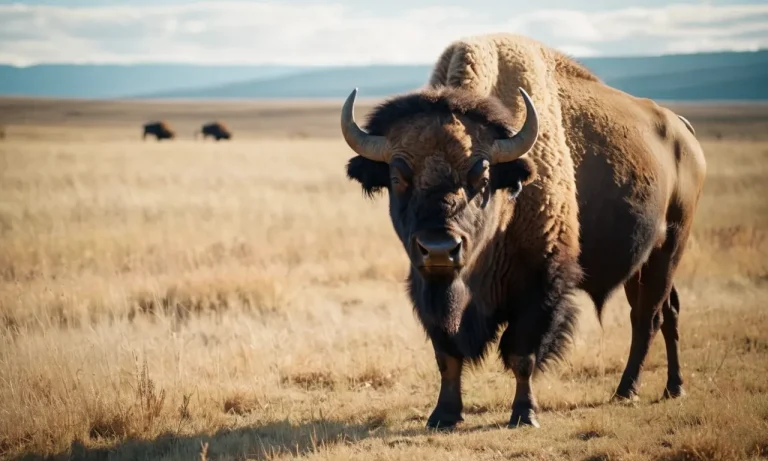What Did God Promise Jacob In The Bible?
For centuries, readers of the Bible have wondered about the promises God made to the patriarch Jacob. These divine pledges shaped the course of biblical history and forged a covenant between God and the nation of Israel.
If you’re short on time, here’s a quick answer to your question: God made several important promises to Jacob in the book of Genesis, including assurances of land, prosperity, protection, and that his descendants would become a great nation.
In this in-depth article, we will explore the key promises God made to Jacob, looking at the scriptural context and the significance of these pledges for Jacob, his descendants, and biblical history overall.
The Promise of Land and Descendants
The Covenant with Isaac Passed to Jacob
God had previously made a covenant with Abraham and his son Isaac, promising to give the land of Canaan to their descendants (Genesis 17:1-8). When Isaac’s son Jacob was born, this covenant passed down to him as well.
As the grandson of Abraham, Jacob became the next recipient of God’s promise to make Abraham’s descendants into a great nation and give them the land of Canaan.
This promise is reiterated in Genesis 28 after Jacob has a dream at Bethel of a stairway to heaven with angels ascending and descending on it. In the dream, God stands above the stairway and tells Jacob “The land on which you lie I will give to you and to your offspring” (Genesis 28:13).
This reaffirmed that Jacob and his descendants were now inheritors of the land originally promised to Abraham.
God’s Promise of Land to Jacob’s Descendants
God later expands on this land promise and specifies the boundaries of the lands that will belong to Jacob’s descendants. After Jacob’s name is changed to Israel, God tells him “To your offspring I give this land, from the river of Egypt to the great river, the river Euphrates” (Genesis 15:18).
This expanded area encompassed lands to the west of Canaan including the coastal regions along the Mediterranean Sea.
This promise was fulfilled as the 12 tribes of Israel settled throughout these regions west of the Jordan River after their Exodus from Egypt. The tribe of Judah settled farther south around Jerusalem while northern tribes like Ephraim and Manasseh settled in the fertile lands near the Sea of Galilee.
Control of these lands ebbed and flowed throughout Israel’s history, but regardless of earthly powers, God had declared this territory belonged to the descendants of Jacob forever. Though they faced exile and dispersion, their rightful claim on the land remained.
God’s promise to Jacob was unconditional and could not be revoked.
The Promise of God’s Continued Presence
Jacob’s Dream at Bethel
One of the most significant promises God made to Jacob was during his famous dream at Bethel. As Jacob was fleeing from his brother Esau, he stopped for the night and had a vivid dream of a ladder extending from earth to heaven, with angels ascending and descending on it.
At the top of the ladder stood God, who promised Jacob, “I am with you and will watch over you wherever you go, and I will bring you back to this land. I will not leave you until I have done what I have promised you” (Genesis 28:15).
This was an incredible promise that God would be continually present with Jacob, protecting and guiding him through all his wanderings and travels. Even though Jacob would be far from his homeland, God assured him that He would never abandon him but remain by his side.
God also promised to eventually bring Jacob back to the land of Canaan, reaffirming the covenant blessings he had inherited from Abraham and Isaac. This dream left a profound impact on Jacob, who awoke declaring “Surely the Lord is in this place, and I was not aware of it” (Genesis 28:16).
He named the place Bethel, which means “house of God.”
Jacob’s Return to Bethel
Many years later, after living in Paddan Aram and building his large family and livestock herds, God called Jacob to return to Bethel and build an altar there, reaffirming the promise first made to him (Genesis 35:1). Jacob obeyed, leading his household back to Bethel.
When they arrived, Jacob built an altar and worshipped God, thanking Him for keeping all His promises of protection, provision, and offspring during Jacob’s long absence (Genesis 35:2-7). Jacob was also given a new name by God – Israel – symbolizing his spiritual growth and submission to God’s will.
This return to Bethel powerfully displayed how God had been continually present with Jacob through all his life’s journeys, just as promised that fateful night long ago. Despite Jacob’s own failings and imperfections, God never abandoned him but remained faithful, bringing him back safely to the land of promise.
Jacob’s life illustrates how God patiently works through the ups and downs of our lives to accomplish His purposes, as He guides us every step of the way.
The Promise of Protection and Prosperity
Jacob’s Flight from Esau
After deceiving his father Isaac into giving him the blessing meant for his older brother Esau, Jacob fled his homeland out of fear that Esau would kill him (Genesis 27:41). Alone and on the run, Jacob must have felt afraid and anxious about his future.
Yet God met Jacob to provide comfort and make incredible promises of protection and prosperity.
Stopping at a “certain place” for the night, Jacob took a rock for a pillow and went to sleep (Genesis 28:11). As he slept, God gave Jacob an encouraging dream of a stairway resting on the earth with its top reaching to heaven with angels ascending and descending on it. Standing above the stairway was the Lord, who made a unilateral covenant with Jacob by saying, “I am the Lord, the God of your father Abraham and the God of Isaac.
I will give you and your descendants the land on which you are lying. Your descendants will be like the dust of the earth” (Genesis 28:13-14).
Jacob’s Prayer for Deliverance
Years later, when Jacob was on his way back to his homeland, he heard that Esau was coming to meet him with 400 men, which made him “greatly afraid and distressed” (Genesis 32:7). The night before their meeting, Jacob prayed desperately for deliverance from his brother:
| Then Jacob prayed, “O God of my father Abraham, God of my father Isaac, Lord, you who said to me, ‘Go back to your country and your relatives, and I will make you prosper,’ I am unworthy of all the kindness and faithfulness you have shown your servant.” (Genesis 32:9-10) |
Jacob’s prayer recalls God’s promise at Bethel to protect him, bless him, and make his descendants prosper. Clinging to this promise in a time of fear and danger, Jacob essentially asks God to keep His word by delivering him from Esau’s hand.
After his prayer, Jacob divided his people and flocks into two groups, thinking “If Esau comes and attacks one group, the group that is left may escape” (Genesis 32:7-8).
God indeed kept His promise by changing Esau’s heart so that he ran to embrace Jacob when they met, rather than attack him (Genesis 33:4-5). Later, God made good on the promise to prosper Jacob greatly in livestock, servants, and other possessions (Genesis 30:43, 31:1-9).
Most significantly, Jacob’s twelve sons fathered the twelve tribes of Israel, fulfilling God’s pledge to make Jacob’s offspring innumerable like the dust (Genesis 35:22-26).
The Promise of a Great Nation
God made an important covenant with Jacob that had profound implications for the future nation of Israel. This covenant contained the promise that Jacob’s descendants would become a great nation and inherit the land of Canaan.
Jacob’s Twelve Sons as Patriarchs
Jacob, whose name was changed to Israel, had 12 sons who became the patriarchs and founders of the 12 tribes of Israel. Their names were Reuben, Simeon, Levi, Judah, Issachar, Zebulun, Joseph, Benjamin, Dan, Naphtali, Gad and Asher (Genesis 35:23-26).
God promised Jacob that his offspring would be like the dust of the earth and spread abroad to the west, east, north and south (Genesis 28:14). This indicates that Jacob’s descendants would be extremely numerous and dispersed throughout the Promised Land.
Jacob’s sons became the progenitors of the 12 tribes that made up the nation of Israel. When the Israelites entered Canaan after their Exodus from Egypt, the land was divided among the 12 tribes. The tribes traced their ancestry back to their founding father, one of the 12 sons of Jacob (Numbers 1:20-43).
God Renews the Covenant with Jacob
After Jacob returned to Canaan from Paddan Aram, God appeared to him again and reiterated the covenant promise He had made before (Genesis 35:9-12). God promised to make Jacob fruitful and multiply his descendants exceedingly.
He also reaffirmed that Jacob’s offspring would inherit the land He had promised to Abraham and Isaac. This covenant promise was passed down to Abraham, Isaac and now Jacob.
Importantly, God changed Jacob’s name to Israel, saying “A nation and a community of nations shall be from you, and kings shall come forth from you” (Genesis 35:11). This indicates that Israel will not only be a great nation, but a community of nations.
Israel’s descendants did multiply greatly in the land of Canaan, eventually establishing the United Kingdom of Israel under Kings Saul, David and Solomon.
God’s covenant promise to make Israel into a great nation was fulfilled as their descendants greatly increased in number. The 12 tribes that came from Jacob’s sons settled throughout Canaan and established themselves as the nation of Israel.
Even through exile and dispersion, the Israelites maintained their identity as a distinct people down to the modern day. God has preserved them as He promised Jacob so long ago.
Conclusion
The promises God made to Jacob were central to the patriarch’s life and set the course for the future nation of Israel. God pledged blessings of land, prosperity, divine presence, protection, and national greatness.
These assurances established an enduring covenant between God and Abraham’s descendants. For Jacob, they provided direction during difficult times and motivation to follow God’s will. The fulfillment of these promises shaped biblical history, making the pledges to Jacob an essential part of the grand narrative of Scripture.








